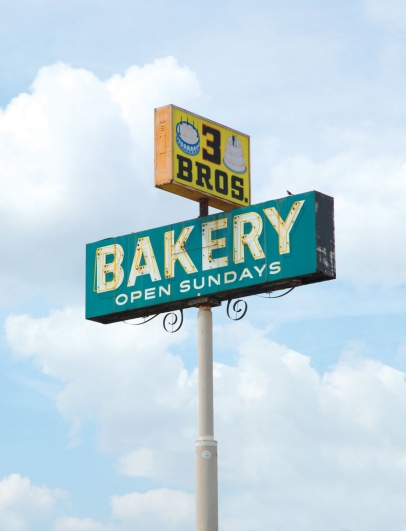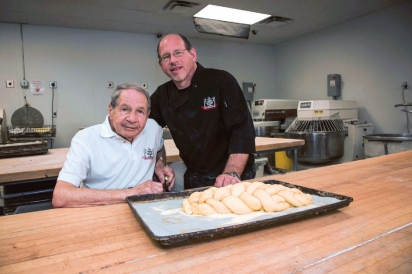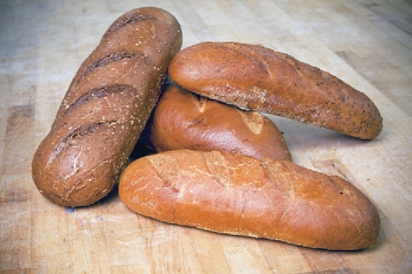It’s Been a Challah-Vah Life
Three Brothers are ‘memory makers who happen to be bakers’
Eat three slices of rye bread every day. That’s what I do.” This was the advice I got from Sigmund Jucker, the soft-spoken, wise patriarch of the Three Brothers bakery empire and the last survivor of his siblings, when I asked him his secret to living to 93 years of age. And just in case I needed more proof of the benefits of rye bread, he added: “My doctor never ate any white bread, only rye bread, and he lived to 99!”
Sigmund and his two brothers, Sol and Max, opened their first bakery in Houston on May 8, 1949, on Holman Street.
“It was very hard to get the people of Houston to buy rye bread and to eat better because they had never seen it before,” said Sigmund. “We had to train them to eat rye, because they were used to white bread, which was like eating cotton”—wrinkling up his nose at the mention of white bread. Sigmund and his brothers persevered for many years before their rye bread became a staple here. “I was the first person to bring pure rye flour to Houston. People here had never seen it before. We are still using the same flour supplier who brought it from Minneapolis.”
Sigmund described some of the changes he has seen here: “When I first got here, Houston was a small, little town that is now a great metropolis and the people are more educated and sophisticated about what they put in their body.”
The long journey to Houston started in Chrzanów, Poland, when Sigmund was 10 years old and he began helping out in his mother’s bakery, which dates to the first half of the 19th century. “There was no machine to mix the dough back then, so we did it all by hand, in a big trough. I used to mix 1,100 kilos of flour, three times a day—all by hand,” Sigmund told me, jolting his head up to ensure that I heard that correctly and awaiting confirmation from me that I had.
Sigmund learned his trade for nine years until 1941, when the family was interned in concentration camps, where Sigmund spent five years. He became quite pensive as he recounted part of his time there. “My job was to dismantle Polish houses. For every 10 houses we dismantled, we built one for a German family,” he said. “My next job was to clean a 500-liter kettle three times a day from 5 in the morning until 7 at night. For three months I lived on one spoon of food a day. When you have no food, it gives you a different perspective on the value we put on it,” he added.
After being liberated by Russian forces, Sigmund and his brothers spent time in Czechoslovakia and Germany before deciding to move to the U.S. “First we moved to Boston, where we had a cousin, then New Jersey and then Houston. It took two days and two nights to get to Houston by train and when I arrived I took any job I could find,” Sigmund said. The job he found was at Henke & Pillot, a Houston-based supermarket chain, popular from the 1880s until 1955, when it was acquired by the Kroger Co. Towards the end of 1949, after working long hours, he turned to his brothers and said: “Enough is enough; we have to do something ourselves.” That something was a bakery. By 1955 they had outgrown their original location on Holman and moved to Almeda, where they remained for five years before moving, in 1960, to their current location on South Braeswood.
“We use the same recipe to make the rye bread that has been in our family for 200 years and we never use preservatives of any kind,” Sigmund said with a look of satisfaction. “Eating all these chemicals they use nowadays causes a lot of problems. I never used a chemical or preservative of any kind.”
When I inquired about his thoughts on the current trend toward avoiding gluten, his head rose up, his nose wrinkled, he smiled and said: “Why do you want to take out the best of the bread? What’s left? If you take out the gluten, not much left. It is not bread, it is cotton.”
His son, Bobby, now runs the business and when he talks of the bread he learned to bake from his father, he talks about it fondly, lovingly, with care and a whole lot of passion, almost as if it’s a person, moving his hands as if he were kneading the dough.
“Making rye bread is tricky. The dough likes to be touched, moved and mixed. You have to keep it alive at least twice a day. It’s like a child that needs attention. You have to care for it and check on it every day,” said Bobby. He learned how to braid bread from his father and when he was 15, “I watched and watched and finally it was my turn and after I screwed it up a number of times, I finally got the hang of it. It has to be done fast and not slow,” he added.
There is little that can beat the aroma when you enter the bakery. It’s an intoxicating mix of sugar, chocolate, flour and spices, which makes it completely impossible for me to leave with only one thing. Each time I visit, I inhale deeply, taking in all the smells the bakery has to offer, and I come away with way more than I need or had planned to buy. I may go for a loaf of their famous rye bread and come out with onion flatbread, two or three hammantaschen, a gingerbread man, some bagels and perhaps even a slice of their incredibly moist and creamy cheesecake or their Pumpecapple Pie Cake—a pumpkin pie, topped with a pecan pie, on top of which is an apple pie topped with cream cheese icing and caramel. It got national attention last year when it was mentioned in the “Weekend Update” skit of Saturday Night Live, where it was described as “Texas diet cake.”
Three Brothers Bakery has three locations: the main one at 4036 S. Braeswood; one at 12393 Kingsride Lane in the Memorial area and their newest, showcase store at 4606 Washington, which has an excellent coffee bar, plenty of places to sit and a dog-friendly patio where canine companions can enjoy fresh-baked treats.
“It’s a great feeling to be able to make people happy every day,” said Bobby. “Like my wife says, we’re memory makers that happen to be bakers.”
At the conclusion of my interview with Sigmund, as I was heading towards the door, he imparted one more piece of advice: “Rye bread never gonna make you fat.” That’s advice that’s worth following.






